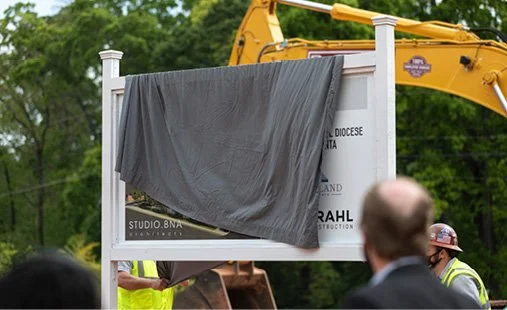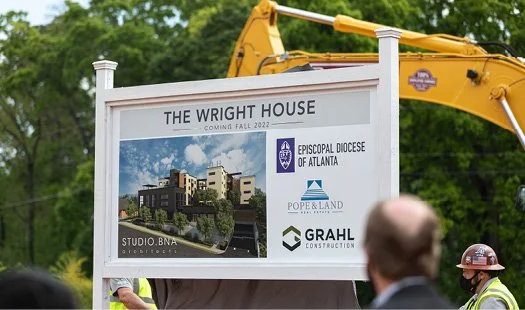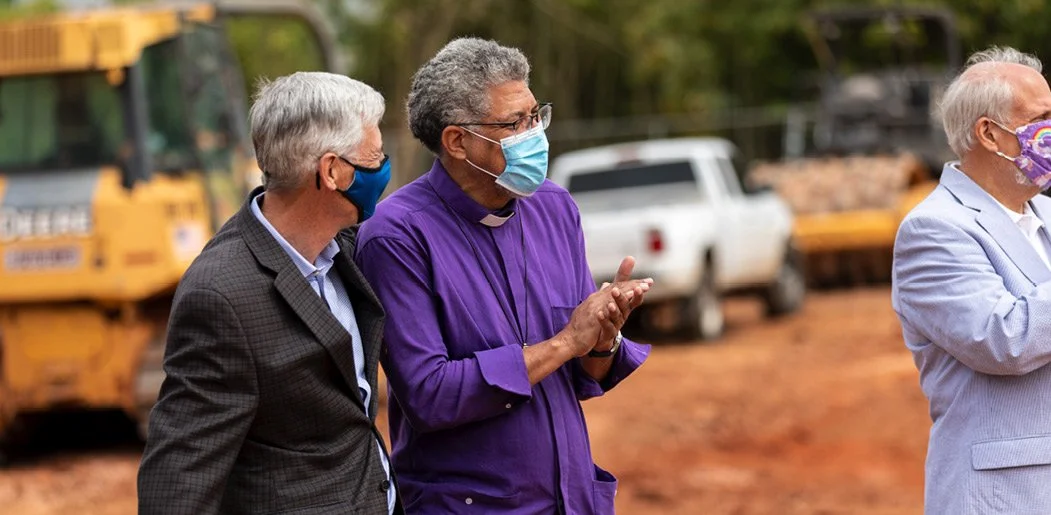Breaking New Ground

Rising from a hole at 980 South Lumpkin Street on the University of Georgia campus—where the longtime university Episcopal Center was recently razed—the new Wright House will be “smack-dab in the middle of the university campus in walking distance of everything.”
That’s the description of its placement given by the Rev. Dr. Lang Lowrey, canon for Christian Enterprise in the Diocese of Atlanta and a faculty member at Emory University’s Candler School of Theology.
But a prime location and a new building are only part of the excitement that surrounds the project. Wright House will also offer an innovative approach to campus life—a place where students can live, study, and pray.
The live, study, pray concept is designed to fulfill the needs of a new generation of college students, said Lowrey, a leader in the project. The church noticed that a segment of today’s students who are heavily invested in their studies are also deeply serious about their spiritual lives, he said. Many are also environmentally conscious, and they get involved in social justice. “They’re very intentional about getting out into the world and being a force for good.”
The new center will be named for Bishop Rob Wright of the Episcopal Diocese of Atlanta. Bishop Wright “is very focused on the fact that the church cannot survive going forward on just catering to people sixty-five and older,” Lowrey said. “He wants to reinvigorate our diocese with youth.
Scheduled to open in the fall of 2022, the center will have a capacity of more than one hundred students. It will combine top-notch, semiprivate living space—pods of two, three, or four beds—with communal areas including a roof deck, community kitchen, fitness room, coffee shop, and chapel. Episcopal students will be given some preference, but the facility will be open to other denominations and faiths and those with no affiliation. A foundation is being established to make it possible for students who cannot afford the full cost to live there, and nonresident students will be invited to participate in events and activities.
The Rev. Clayton Harrington, campus missioner for the last three years, will be the live-in chaplain. Harrington, who was raised Baptist in rural North Carolina, entered Emory’s Candler School of Theology expecting to be an academician. Then, an introduction to the Episcopal Church through St. Luke’s in Atlanta started him on the path to a master’s in divinity. An internship at the Cathedral of St. Philip sealed his plan for the priesthood.
Harrington had not yet been ordained when he was named missioner to the university.
“THIS WON’T JUST BE A PLACE WHERE YOU SLEEP AT NIGHT. WE’RE HOPING IT CAN BE A HUB OF COMMUNITY LIFE.”
Because he couldn’t administer the eucharist, he brought in priests from across the diocese.
He—and student participants—found that they appreciated the diversity. He said he would like to continue having guest priests in the new Wright House.
“It’s good for college students to be exposed to a variety of voices,” he said. “I like to invite people whose life stories are not my life story.”
Soon after Harrington took the position as missioner, the pandemic shut down activities, and worship moved online. He learned early in his priesthood to be flexible, a trait that will come in handy as he takes on the innovative new role at the Wright House.
Harrington, who is gay, said he hopes students will find the same kind of warm community and open-mindedness at the Wright House that he found in the Episcopal Church.
“This won’t just be a place where you sleep at night,” he said. “We’re hoping it can be a hub of community life.”
For University of Georgia senior Liz Hammond, from Thomaston, Georgia, the former Episcopal Center went a long way toward fulfilling that role. Like Rev. Harrington, she grew up Baptist. “When I went to college, I decided that I wanted to see if there was another church that would be better suited for me,” she said. When she was a freshman, a friend invited her to the Episcopal Center, and, she said, “I never left.” She was elected to the vestry in her sophomore year, then became junior warden.
The new center, begun in spring, 2021, is expected to open in fall, 2022.
“I attended every activity we did,” she said. “The Episcopal Center has been an integral part of my college experience. I would spend hours there every week. I did my homework there and would wait for people to come in so I could have conversations. The Episcopal Center gave me a home, a place where I felt comfortable and safe.”
Junior Demi Lehman, from Norcross, Georgia this year’s senior warden, is a cradle Episcopalian who also started visiting the center as a freshman. There, she said, she found a “feeling of community. It was very comforting.”
Both said they are excited about the possibilities with the new center but will miss the old one. While the Wright House brings a bold new vision to college ministry, it comes with a tinge of bittersweetness for generations of students who exercised their faith and made lifelong friends in the old building.
“So many holy moments happened in that space,” said Rev. Harrington. “There’s sadness in saying goodbye to what’s old as we joyfully anticipate what is new.”




